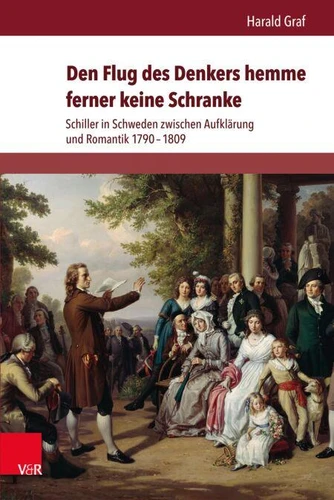Den Flug des Denkers hemme ferner keine Schranke. Schiller in Schweden zwischen Aufklärung und Romantik 1790–1809
Par : , , ,Formats :
Disponible dans votre compte client Decitre ou Furet du Nord dès validation de votre commande. Le format PDF est :
- Compatible avec une lecture sur My Vivlio (smartphone, tablette, ordinateur)
- Compatible avec une lecture sur liseuses Vivlio
- Pour les liseuses autres que Vivlio, vous devez utiliser le logiciel Adobe Digital Edition. Non compatible avec la lecture sur les liseuses Kindle, Remarkable et Sony
 , qui est-ce ?
, qui est-ce ?Notre partenaire de plateforme de lecture numérique où vous retrouverez l'ensemble de vos ebooks gratuitement
Pour en savoir plus sur nos ebooks, consultez notre aide en ligne ici
- Nombre de pages654
- FormatPDF
- ISBN978-3-8470-0223-9
- EAN9783847002239
- Date de parution14/05/2014
- Protection num.pas de protection
- Taille4 Mo
- Infos supplémentairespdf
- ÉditeurV&R Unipress
Résumé
Harald Graf submits in his wide-ranging thesis the first thorough analysis of the Schiller-reception in Sweden from its beginnings around 1790 till the Romantic and provides concurrently a multifarious panorama of the literary life in the late Enlightenment and the early Romantic in Sweden. The reappraisal of the Schiller-reception in Sweden - in the first place he was not received from the Romantic but from the Enlightenment philosophers and writers - is not only pertaining to the historic Schiller perception but also to the contours of the Swedish Enlightenment in general.
Breaking up the underestimation of the Enlightenment in the Swedish literary studies, the years between 1790 and 1809 are construed as late Enlightenment, and this Enlightenment is not following the French model, as it often was claimed, but the German paradigm. According to the methodical direction in the intersection of the history of reception, literary sociology, conceptual history und New Historicism not only high literature is taking into account but also Schiller's broad impact on the literary public in Sweden: Schiller was straight man of a generation, which liked to prevail against the dominant Zeitgeist.
Breaking up the underestimation of the Enlightenment in the Swedish literary studies, the years between 1790 and 1809 are construed as late Enlightenment, and this Enlightenment is not following the French model, as it often was claimed, but the German paradigm. According to the methodical direction in the intersection of the history of reception, literary sociology, conceptual history und New Historicism not only high literature is taking into account but also Schiller's broad impact on the literary public in Sweden: Schiller was straight man of a generation, which liked to prevail against the dominant Zeitgeist.
Harald Graf submits in his wide-ranging thesis the first thorough analysis of the Schiller-reception in Sweden from its beginnings around 1790 till the Romantic and provides concurrently a multifarious panorama of the literary life in the late Enlightenment and the early Romantic in Sweden. The reappraisal of the Schiller-reception in Sweden - in the first place he was not received from the Romantic but from the Enlightenment philosophers and writers - is not only pertaining to the historic Schiller perception but also to the contours of the Swedish Enlightenment in general.
Breaking up the underestimation of the Enlightenment in the Swedish literary studies, the years between 1790 and 1809 are construed as late Enlightenment, and this Enlightenment is not following the French model, as it often was claimed, but the German paradigm. According to the methodical direction in the intersection of the history of reception, literary sociology, conceptual history und New Historicism not only high literature is taking into account but also Schiller's broad impact on the literary public in Sweden: Schiller was straight man of a generation, which liked to prevail against the dominant Zeitgeist.
Breaking up the underestimation of the Enlightenment in the Swedish literary studies, the years between 1790 and 1809 are construed as late Enlightenment, and this Enlightenment is not following the French model, as it often was claimed, but the German paradigm. According to the methodical direction in the intersection of the history of reception, literary sociology, conceptual history und New Historicism not only high literature is taking into account but also Schiller's broad impact on the literary public in Sweden: Schiller was straight man of a generation, which liked to prevail against the dominant Zeitgeist.



